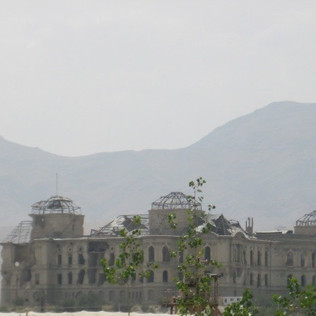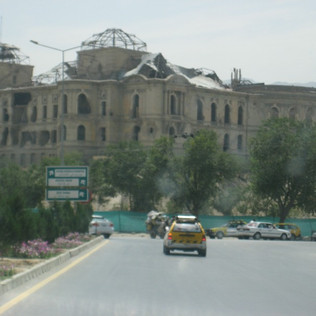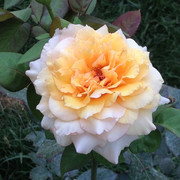Expat Life in Afghanistan
- Karla Fraser
- Jul 28, 2020
- 8 min read
Updated: Jul 31, 2020
Experiences of Roseapple Global's Founder - (2012-2013)

Facts About Afghanistan
A country known for its on-going wars with other nations for 40+ years, Afghanistan is much more. Its geographical location is in the middle of Central and South Asia. It is locally referred to as the "stan" nation as seven countries in the region end in "stan." The country is landlocked and shares borders with Pakistan, Iran, Turkmenistan, Uzbekistan, Tajikistan, and China.
The official name of this multicultural and multi-ethnic country is the Islamic Republic of Afghanistan, and the official religion is actually Islam. Afghanistan's capital Kabul is surrounded by the Hindu Kush Mountain Range which comprises three mountains. Its population of approximately 34,940,837 million is made up of seven primary ethnic groups. Afghanistan is also the 37th most populous country in the world. The official languages are Dari and Pashto, and its currency is Afghani (AFN). The primary source of income is agriculture, but it is rich in natural resources such as natural gas and oil. The country exports opium, fruits, nuts, handwoven rugs, and some precious gemstones.
At different points in its history, the government was a monarchy and a democratic republic. Now, the government in Afghanistan is led by a President who can serve a maximum of two 5-year terms. There is a National Assembly, which is a bicameral legislature. The legislature comprises The House of the People having 249 members and The House of the Elders with 102 members. The names of these two legislatures are Wolesi Jirga and Meshrano Jirga. The President is also responsible for appointing the nine justices of the Supreme court. These Justices are also appointed to serve 10-year terms.
Afghanistan experiences all four seasons.
How long did it take you to settle in?
Photos (Left to Right): Tree overlooking the front garden in the residence - winter and spring.
I lived in Kabul, Afghanistan, for 14 months (2012-2013). Settling in as an expat started with my luggage not arriving when I arrived. The suitcase came four days later, and items were missing. I was very thankful that my two boxes of personal belongings arrived the day after I did. They had some clothes and essentials. Besides the late bags, it was relatively easy. I was able to immediately move into my ensuite room in our guesthouse and get settled. Seven colleagues shared the guesthouse in which I lived; four were on my floor. We shared the common area, kitchen, and laundry facilities. We also shared the entertainment room, which had some gym equipment.
What was the hardest aspect of your adjustment, and how did you overcome it?
It was the restriction in movement. It was for my safety and well-being, but when you are accustomed to moving about your location freely, it is hard when you cannot. I had to change my mindset about being in the city. I had to intentionally plan for what I could do when it could be done and the necessary precautions. After about a month of being there, and with the help of colleagues, it became routine. You also learn to be comfortable at home and in your living space. In some ways, it is not different from the stay-at-home or lockdown restrictions we are experiencing during this 2020 global pandemic of COVID-19.
Navigating cuisine and culture were manageable; the languages (Dari & Pashto) were challenging as I am not a linguist, and learning a language does not come naturally to me. The work-week is Sunday to Thursday, and some aspects of the Islamic culture were already familiar to me.
Photos (Left to Right): Ruby red and sweet pomegranate, Refreshing watermelon, The local streetside watermelon vendor, and Dessert platter of all locally grown melons, berries, apricots, and peaches. (2012-2013)
What would you say is a 'must-see/must-do'?
This is a challenging question. I am aware that the country is filled with historical sites and hidden gems. However, during my time there, I was unable to travel outside of Kabul. Yet, within Kabul, there are some museums and remnants of it when a monarchy ruled the country. I did have the chance to visit the remains of the palace and travel to one of the main hilltops overlooking the city.
Must do…have fresh pomegranates as they are amazingly sweet. Get the local Afghan bread (naan) from the street vendor fresh from the oven and eat it while it is still hot. Smell the roses; they are beautiful, fragrant, and everywhere in the city. If you can find the music institute, listen to traditional music plus learn about the instruments. If you can visit local restaurants or the market, you can enjoy fresh produce, dairy, and meats, which are local meals.
Photos (Left to Right): Darul Aman Palace, Kabul from different viewpoints (2012)
Places like Herat and Bamyan are cities that have an area of interest like carpet-weaving or glass-blowing. The woodworking and carved home accessories, along with hand-painted ceramic items, make wonderful keepsakes or gifts.
Another must-do, if you have the time and opportunity, is to volunteer. There are many worthy and needy cases from tutoring students to animal rescue. Find a reputable organization to give the gift of time, talent, and skills that will impact and enrich the local community.
Beside warm local bread or pomegranates, you should also try the lamb kebabs or meatballs as well as apricots. A nice treat: Bolani - using Afghan bread; it is prepared either by baking or frying and has a stuffing of ingredients like potatoes, pumpkin, chives, lentils, and leeks.
Places to visit: Herat Citadel, Buddhas of Bamiyan, Garden of Babur - Kabul, National Museum of Afghanistan - Kabul and Darul Aman Palace - Kabul
How did you adjust to the cultural differences having a 'western' point of view?
Because I had lived in the UAE, another Islamic nation, I was familiar with various parts of life in a Muslim country. However, Afghanistan is at the more conservative end of the spectrum, so there are things about attire, male interaction, and my level of movement within the city that required adjustments. Overall the adjustment was not challenging as I asked questions to gain insights. I adjusted my behaviors accordingly.

Both men and women dress conservatively. As women, your attire must be loose-fitting, covering your ankles and wrists, and close to your neck. You must cover your hair/head in public and some indoor spaces too.
Things are gender-separated minus some places like hotels and restaurants geared toward foreigners in the country, who primarily work for NGOs, contractor companies, or the military.
I had students who were warm and kind enough to invite me to celebrations, like weddings or iftar dinner, but due to safety reasons attending was not possible.
During the winter months and Ramazan (Ramadan), the city is quiet overall. Many restaurants and stores closed during the day for Ramazan but opened in the evening. You should expect limited western brand foods and no alcohol unless you can access the UN or military compound markets. I learned to adjust and tried eating a local or regional brand of packaged products. I ate fresh goat’s milk cheese, lots of seasonal produce, and was thankful to find some western favorites in supermarkets roughly once a month like Swiss Aloe Vera yogurt.
Living in a war zone, how did you practice self-care?

I was fortunate; there was a hotel that was on our approved facilities list. Periodically, I would visit for meals and self-care. In fact, I spent my 2013 birthday at the spa. I had a massage, haircut, manicure, and pedicure. Later that evening, I had dinner with colleagues at one of their restaurants. These moments were rare and precious. Regular self-care with dining out at an approved cafe in town and enjoying the roses found everywhere in the city. The opportunities to leave the city and country were immense self-care moments, mentally and physically. During my time living in Kabul, I visited the UAE, Sri Lanka, and the Maldives for leisure plus a trip to the US for work.
Where were you before arriving in Afghanistan?
I went to Afghanistan from Nebraska, USA. This was my return to living internationally after a two-year break. I also returned to an international higher education job.
Afghanistan is the second international job that I had. It's also number two in my journey for living and working abroad.
What was an unexpected challenge or the delight of this country?
The delight was roses. Once spring arrived, roses could be found. They ranged from light pastel to bright brilliance in color. They grew in yards, cafe gardens, sidewalks, or even in the median on the road. Due to the travel restriction, I was not able to visit other parts of the country. There is much artisan history in the other city like glass blowing in Herat and carpet weaving in other places, but due to travel safety, we were not permitted to make these journeys.
Photos: Roses of various hues and varieties taken around the city. - (no filter) (2012-2013)
I enjoyed a variety of cuisines which included Korean, French, Lebanese, Thai, Italian, and more. My dining out experiences included brick oven pizza, Pad Thai noodles, mezze platter, to warm croissants. There was no lack of good food when dining out when given a chance.
Is there any advice you'd like to share with someone who's interested in Afghanistan?
Many readers of this story will not want to move or even visit this country. You must desire to travel to all the recognized nations throughout the world, have a passion for the NGOs in the country, or are assigned by your organization. My advice for those planning to go to Afghanistan for any reason, do your homework! If you are a female, do some additional mental preparation and a bit more conservative thinking. It is an Islamic nation; some things are appropriate, and some are not. The country is faith-based and conservative.
There is an on-going war, and you should always be prepared to depart the country on a moment's notice. In other words, grab your passport and some funds, and be ready to leave. Know that you are residing in a country with strong traditional, cultural, and religious values. So refrain from political and religious arguments or commentary.
I recommend that you learn the basics of both the official languages. "Hello, thank you, good day" - those simple phrases. Some people may correct you, but they appreciate the fact that you're trying. Learning the language can be beneficial when you are in the market or for any emergencies.
Photos: Random places around the city - a mix of traditional and modern. (2012-2013)
Final Thoughts
Now the view of Afghanistan is a country at war; women have no freedom, girls cannot attend school, and the list goes on. In some respect, some of this is accurate, but here’s the view that I now share. The people are kind; it has a rich history and culture. In the years prior to the wars, the 1940s, 50s, 60s, some women did dress to common western standards, and their roles in society were from housewife to physicians to scientists. Yes, the war and the struggles for control by varying groups changed the culture, society, and practices. However, there is a sector of the younger generation, those under 35, who are seeking to reform, revitalize, and renew their country in as many areas as possible from sports to science from technology to philosophy. It is a slow process with many hurdles, roadblocks, and detours, but they are resilient and determined in this generation to see the country become different. They were born into it this way, but they want to leave for their children an improved nation.
All photos were taken from Founder, Karla Fraser's Collections.
References
#afghanistan #kabul #roses #freshfruits #darulamanpalace #AFGLife #southcentraltasia #expatexperience #higheredabroad #intlhigheredu #intlstudentaffairs #blackandabroad #expatliving #expatlife #expats #globalmobility #livingabroad #livingoverseas #founderstory #roseappleglobal
If you enjoyed this story the founder and her experiences in Singapore, then please comment as well as share it on LinkedIn, Instagram, Twitter, or Facebook. Thank you!
— Interviewed and written in conjunction in with Caribbean Virtual Assistants, Founder's Experience - Life in Afghanistan for Roseapple Global, LLC
Roseapple Global provides expat coaching and guidance for individuals or groups. We serve all aspiring or continuing expats and specialize in assisting higher education professionals. We also offer to consult for student-facing units of higher education institutions internationally. Our services focus on developing or improving the administrative and operational areas of your departments. We help you unlock your potential, maximize your ability, and equip you with resources and tools for your journey or your student-facing unit. Contact Us








































Comments